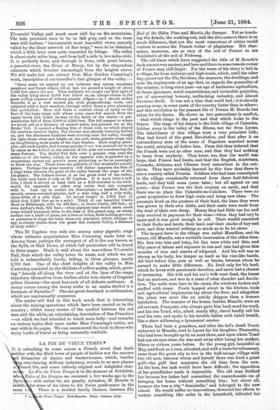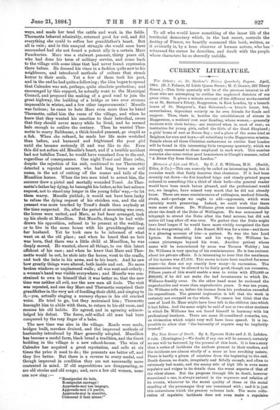LA. FIN DU VIEUX TEMPS.* Ix is refreshing to come
across a French novel that deals either with the illicit loves of people of fashion nor the amours d debauches of slaters and washerwomen, which, besides g entertaining without indecency, reveals to us new phases of rench life, and some entirely original and delightful char- act::. La Fin du Vieux Temps is in the manner of Scioberet, whos Tales of La Gruyere we reviewed a few weeks ago in the Sped°, r; and, unless we are greatly mistaken, M. Bourde is indebte, or some of his ideas to his Swiss predecessor in the
same fie There is a decided family likeness between The
• IQ du Vieux Temps. Paul Bonnie. Paris: Oilman Levy.
End of the Olden Time and Martin, the Sawyer. Yet as touch. ing the details, the working-out, and the dgnouement, there is so much difference, that not the most censorious of critics would venture to accuse the French writer of plagiarism. His char- acters, moreover, are as racy of the soil of France as are Scioberet's of the soil of Fribourg.
The old times which have suggested the title of M. Bourde's book are not very ancient, and here and there in some remote corner of France may still linger. For the scene of his story is laid in a village, far from railways and high-roads, which, until the other day, preserved the life, the ideas, the manners, the dwellings, and even the implements of an age that, as regards the generality of the country, is long since past—an age of barbarous agriculture, of dense ignorance, weird superstitions, and invincible prejudice, yet of unswerving honesty, unflinching industry, and almost ferocious thrift. It was not a time that could last ; it is already passing away, in some parts of the country faster than in others : and this revolution in the peasant life of France M. Bourde has taken for his theme. He shows us two generations in conflict, —that which clings to the past and that which looks to the future. The stage of his drama is the little village of Calendre, hidden away in the valley of the Rhone, not far from Lyons. The inhabitants of this village were a very primitive folk; they had heard of the great Revolution, and that after it an extraordinary man of the name of Napoleon marched across the world, carrying all before him. From this they inferred that the French were not as other men, and that they had nothing to learn from anybody. They knew, too, that the world was large, that France had limits, and that the English, Austrians!, Cossacks, Africans, and Chinese lived somewhere in the out- skirts. They have probably learned by this time that there is also a country called Prussia. Soldiers who had been conscripted in the village occasionally returned from these half-fabnlonsi lands, and they told some queer tales ; but all agreed on one point,—that France was the first country on earth, and that there was no place like Calendre-en-Calodors. There were no great proprietors to draw high rents and bring new ideas. The peasants lived on the produce of their land, the linen they wore was grown in their own fields, and their coats were made from the wool of their own sheep. Money they had little use for, and only received in payment for their wine—when they had any to spare and it was good enough to sell. Their wealth consisted in their flocks and herds, their land, and their stacks of hay and corn, and they wanted nothing so much as to be let alone.
The largest farm in the village was called Mnsellion, and its owner, old Moselle, was a veritable incarnation of the olden time. His face was lean and bony, his lips were white and thin, and fifty years of labour and exposure to sun and rain had given him muscles of iron and sinews of whipcord. And his will was as strong as his body, his temper as hard as his vice-like hands. All bent before him, men as well as beasts, between whom he seemed to make little difference. He lived only for his land, which he loved with passionate devotion, and never lost a chance of increasing. His wife and his son's wife were dead, the house had no mistress, and was in a state of utter disorder and desola- tion. The walls were bare to the stone, the windows broken and stuffed with straw. Fowls hopped about in the kitchen, tools and agricultural implements lay about the floor, and altogether the place was more like an untidy shippen than a human habitation. The inmates of the house, besides Muselle, were an old servant, Francoise, who always gave him back word for word, and his son Tome, who, albeit nearly fifty, dared hardly call his soul his own, and spoke to his terrible father with bated breath, like a slave addressing a tyrannical master.
There had been a grandson, and after the lad's death Tome, unknown to Moselle, sent to Lyons for his daughter, Thermette, who had been brought up by an aunt there, and upon whom Tome had not set eyes since she was sent away after losing her mother, fifteen or sixteen years before. So the young girl, beautiful as May, and fresh as a rose, educated, and with a taste for refinement, came from the great city to live in the half-savage village with two old men, between whom and herself there was fixed a great gulf—the gulf that separates the old time from the new. At the best, her task would have been difficult; the opposition of her grandfather made it impossible. The old man disliked her because her father had committed the unpardonable sin of bringing her home without consulting him ; but above all, because she was a city " demoiselle," and belonged to the new school. He would suffer no innovations, thwarted her efforts to restore something like order in the household, ridiculed her ways, and made her tend the cattle and work in the fields.
Thermette behaved admirably, returned good for evil, and did everything she could to soften her grandfather's heart. But all in vain ; and in this unequal struggle she would soon have succumbed had she not found a potent ally in a certain Marc Panchurien. Marc was a stalwart peasant, thirty years old, who had done his term of military service, and come back to the village with some ideas that had never found expression there before. He dressed his vines in a fashion quite new to his neighbours, and introduced methods of culture that struck horror to their souls. Yet a few of them took his part, and in the end he had quite a following ; the idea began to spread that Calendre was not, perhaps, quite absolute perfection; and encouraged by this support, he actually went to the Municipal Council, and proposed the making of a good road to join the great highway, the building of a bridge or two over streams impassable in winter,•and a few other improvements ! Moselle was furious; he came to hate Marc even more than he hated Thermette, called him the curse of the village, and when he knew that they wanted his sanction to their betrothal, swore that they should never marry while he lived, and he seemed hale enough to outlive the century. Then he wanted Ther- mette to marry Balthazar, a thick-headed peasant, ps stupid as a fish. When she refused, he made her life more wretched than before, and harassed and frightened the poor girl until she became seriously ill and was like to die. Even this did not soften old Muselle's heart, and if a terrible accident had not befallen Tom4, he would have remained firm to the end, regardless of consequences. One night Tome and Marc (who, despite the rejection of his suit, continued to see Thermette) detected a reputed sorcerer, who had long borne an evil name, in the act of cutting off the manes and tails of the Musellion horses. When the two men tried to arrest him, the sorcerer drew a pistol and mortally wounded Tome. As Ther- matte's father lay dying, he besought his father, as his last solemn request, not to stand any longer in the young folks' way,—to let them marry. Moselle yielded ; it would not have been lucky to refuse the dying request of his stricken son, and the old peasant was more touched by Tome's death than anybody at the time suspected. So, after the period of mourning was over, the lovers were -united, and Marc, as had been arranged, took up his abode at Musellion. But Moselle, though he had with- drawn his opposition, refused to be present at the wedding, or to live in the same house with his granddaughter and her husband. Yet he took care to be informed of what went on at the old place ; and when he heard that an heir was born, that there was a little child at Musellion, he was deeply moved. He wanted, above all things, to see this latest offshoot of his race ; and when he knew that Marc and Ther- mette would be out, he stole into the house, went to the cradle, and took the babe in his arms, and to his heart. And he saw how greatly things were altered, both inside and out. No more broken windows or unplastered walls ; all was neat and orderly; a woman's hand was visible everywhere ; and Muscle was con- strained to own to himself that it was better so, that the new time was neither all evil, nor the new men all fools. The visit was repeated, and one day Marc and Thermette surprised their grandfather in the very act of fondling their child, and singing to it,—yes, actually singing a nursery rhyme in his old cracked voice. He tried to go, but they restrained him ; Thermette besought him to abide with them, to return to his old room, and resume his old habits. He agreed, and in agreeing acknow- ledged his defeat. The fierce, self-willed old man had been conquered by the rosy finger of a babe.
The new time was also in the village. Roads were made, bridges built, marshes drained, and the improved methods of
husbandry introduced by Marc generally adopted. Musellion has become a model farm, black bread a tradition, and the finest building in the village is a new school-house. The wine of Calendre has acquired a great reputation, and sells at six times the price it used to do ; the peasants are better off, and they live better. But there is a reverse to every medal, and though improved in condition they are not necessarily more contented in mind. If old superstitions are disappearing, so
are old stories and old songs; and, save a few old women, none can now sing :— "Roasignolet du bole,
Rossignolet sauvage ! Apprendamoi ton langage, Apprendamoi z'e parler, Apprends-moi la maniere, Comment il faut aimer."
To all who would know something of the inner life of the territorial democracy which, in the last resort, controls the destiny of France, we heartily commend this book, written, as it evidently is, by a keen observer of human nature, who has ' witnessed the scenes he describes, and dwelt with the people whose characters he so shrewdly unfolds.



































 Previous page
Previous page